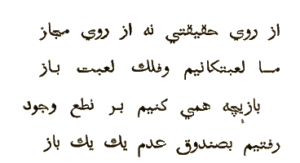One of the hardest lessons of young Sam’s life had been finding out that the people in charge weren’t in charge. It had been finding out that governments were not, on the whole, staffed by people who had a grip, and that plans were what people made instead of thinking.
When we are working at a difficult task and strive after a good thing we fight a righteous battle, the direct reward of which is that we are kept from much evil.
To read my book the virgin shy
May blush while Brutus standeth by,
But when he’s gone, read through what’s writ,
And never stain a cheek for it.Robert Herrick (1591-1674) English poet
“Another [To His Booke],” Hesperides, # 4 (1648)
(Source)
A translation (if not so labeled) of the concluding lines of Martial ep. 11.6. Brutus stands as a paragon of moral rectitude.
Light burthens, long borne, growe heavie.
George Herbert (1593-1633) Welsh priest, orator, poet.
Jacula Prudentum, or Outlandish Proverbs, Sentences, &c. (compiler), # 15 (1640 ed.)
(Source)
Focusing your life solely on making a buck shows a certain poverty of ambition. It asks too little of yourself. You need to take up the challenges that we face as a nation and make them your own. Not because you have a debt to those who helped you get here, although you do have that debt. Not because you have an obligation to those who are less fortunate than you, although I do think you do have that obligation. It’s primarily because you have an obligation to yourself. Because individual salvation has always depended on collective salvation. Because it’s only when you hitch your wagon to something larger than yourself that you realize your true potential.
Barack Obama (b. 1961) American politician, US President (2009-2017)
Speech (2005-06-04), Commencement, Knox College, Galesburg, Illinois
(Source)
No matter what cause one defends, it will suffer permanent disgrace if one resorts to blind attacks on crowds of innocent people in which the killer knows in advance that he will kill women and children.
Albert Camus (1913-1960) Algerian-French novelist, essayist, playwright
Algerian Chronicles [Chroniques Algérienne], Preface (1948) [tr. Goldhammer (2013)]
(Source)
Criticizing the Front de Libération Nationalale (FLN), the movement for Algerian independence (after similarly criticizing the French government for its violent activity).
But in the days that are now passing over us, even fools are arrested to ask the meaning of them; few of the generations of men have seen more impressive days. Days of endless calamity, disruption, dislocation, confusion worse confounded: if they are not days of endless hope too, then they are days of utter despair. For it is not a small hope that will suffice, the ruin being clearly, either in action or in prospect, universal. There must be a new world, if there is to be any world at all!
Thomas Carlyle (1795-1881) Scottish essayist and historian
Latter-Day Pamphlets, # 1 “The Present Time” (1850-02-01)
(Source)
What a lamentable cuss man iz, he pittys hiz nabors misfortunes, bi calling them judgments from heaven.
[What a lamentable cuss man is: he pities his neighbors’ misfortunes, by calling them judgments from heaven.]Josh Billings (1818-1885) American humorist, aphorist [pseud. of Henry Wheeler Shaw]
Everybody’s Friend, Or; Josh Billing’s Encyclopedia and Proverbial Philosophy of Wit and Humor, ch. 144 “Affurisms: Gnats” (1874)
(Source)
Doubtless we’re all mistaken so — ’tis true,
Each is in something a Suffenus too:
Our neighbour’s failing on his back is shown,
But we don’t see the wallet on our own.[Nimirum idem omnes fallimur, neque est quisquam
quem non in aliqua re videre Suffenum
possis. Suus cuique attributus est error,
sed non videmus manticae quod in tergo est.]Catullus (c. 84 BC – c. 54 BC) Latin poet [Gaius Valerius Catullus]
Carmina # 22 “To Varus,” ll. 18-21 [tr. Cranstoun (1867)]
(Source)
Discussing Suffenus, a prolific (but very mediocre) poet, who believes himself to be extremely clever and talented. The metaphor in the last few lines reference Aesop's fable of the two bags.
(Source (Latin)). Alternate translations:
Yet all to such errors are prone, I believe;
Each man in himself a Suffenus may find:
The failings of others we quickly perceive,
But carry our own imperfection behind.
[tr. Nott (1795), # 19]
Yet we are all, I doubt, in truth
Deceived like this complacent youth;
All, I am much afraid, demean us
In some one thing just like Suffenus.
For still to every man that lives
His share of errors Nature gives;
But they, as 'tis in fable sung,
Are in a bag behind us hung;
And our formation kindly lacks
The power to see behind our backs.
[tr. Lamb (1821)]
Yet, which of us is there but makes
About himself as odd mistakes?
In some one thing we all demean us
Not less absurdly than Suffenus;
For vice or failing, small or great,
Is dealt to every man by fate.
But in a wallet at our back
Do we our peccadilloes pack,
And, as we never look behind,
So out of sight is out of mind.
[tr. T. Martin (1861)]
Friend, 'tis the common error; all alike are wrong,
Not one, but in some trifle you shall eye him true
Suffenus; each man bears from heaven the fault they send,
None sees within the wallet hung behind, our own.
[tr. Ellis (1871)]
In sooth, we all thus err, nor man there be
But in some matter a Suffenus see
Thou canst: his lache allotted none shall lack
Yet spy we nothing of our back-borne pack.
[tr. Burton (1893)]
Still, we are all the same and are deceived, nor is there any man in whom you can not see a Suffenus in some one point. Each of us has his assigned delusion: but we see not what's in the wallet on our back.
[tr. Smithers (1894)]
True enough, we all are under the same delusion, and there is no one whom you may not see to be a Suffenus in one thing or another. Everybody has his own fault assigned to him: but we do not see that part of the bag which hangs on our back.
[tr. Warre Cornish (1904)]
After all, every man of us is deceived in the same way, nor is there any one in whom, in some trait or another, you cannot recognize a Suffenus. Every one has his weak point, but we do not see what lies in that part of our wallet which is behind our backs.
[tr. Stuttaford (1912)]
Sure, all men into some such error fall,
There's a Suffenus in us one and all,
Each has his proper fault and each is blind
To the wallet's other half that hangs behind.
[tr. MacNaghten (1925)]
Have we not all some faults like these?
Are we not all Suffenuses?
In others the defect we find,
But cannot see our sack behind.
[tr. Landor (c. 1926)]
And we (all of us) have the same rich glow, the rapture
when writing verse. And there is no one living
who cannot find within him something of Suffenus,
each his hallucination that blinds him,
nor can he nor his sharp eyes discover
the load on his own shoulders.
[tr. Gregory (1931)]
Well, we all fall this way! There's not a person
whom in some matter you can fail to see
to be Suffenus. We cart round our follies,
but cannot see the bags upon our backs.
[tr. Fraser (1961)]
Conceited? Yes, but show me a man who isn't:
someone who doesn't seem like Suffenus in something.
A glaring fault? It must be somebody else's:
I carry mine in my backpack & ignore them.
[tr. C. Martin (1979)]
Of course we’re all deceived in the same way, and
there’s no one who can’t somehow or other be seen
as a Suffenus. Whoever it is, is subject to error:
we don’t see the pack on our own back.
[tr. Kline (2001)]
Clearly we are all deceived in the same way, nor is there anyone
Whom you could see not to be Suffenus in some thing.
To each one of us one's own mistakes have been assigned;
but we do not see the knapsack which is on our back.
[tr. Drudy (1997)]
Ah well, we all make that mistake -- there's not
one of us whom you can't in some small way
see as Suffenus. Each reveals his inborn flaw --
and yet we're blind to the load on our own backs!
[tr. Green (2005)]
Evidently we all falter in the same way, and there is no one
whom you cannot see Suffenus in some fashion.
To each man is attributed his own error;
but we do not see the kind of knapsack which is on our back.
[tr. Wikibooks (2017)]
Evidently we all are deceived the same way, nor is there anyone
whom you are not able to see Suffenus in some way.
To each their own error has been assigned;
but we do not see the knapsack which is on our back.
[tr. Wikisource (2018)]
A musician would not willingly consent that his lyre should be out of tune, nor a leader of a chorus that his chorus should not sing in the strictest possible harmony; but shall each individual person be at variance with himself, and shall he exhibit a life not at all in agreement with his words?
[εἶτα μουσικὸς μὲν οὐκ ἂν ἑκὼν δέξαιτο ἀνάρμοστον αὐτῷ τὴν λύραν εἶναι, καὶ χοροῦ κορυφαῖος μὴ ὅτι μάλιστα συνᾷάδοντα τὸν χορὸν ἔχειν” αὐτὸς δέ τίς ἕκαστος διαστασιάσει πρὸς ἑαυτόν, καὶ οὐχὶ τοῖς λόγοις ὁμολογοῦντα τὸν βίον παρέξεται.]
Basil of Caesarea (AD 330-378) Christian bishop, theologian, monasticist, Doctor of the Church [Saint Basil the Great, Ἅγιος Βασίλειος ὁ Μέγας]
Address to Young Men on Reading Greek Literature, ch. 6, sec. 4 [tr. Deferrari/McGuire (1933)]
(Source)
Children ask better questions than do adults. “May I have a cookie?” “Why is the sky blue?” and “What does a cow say?” are far more likely to elicit a cheerful response than “Where is your manuscript?” “Why haven’t you called?” and “Who’s your lawyer?”
Fran Lebowitz (b. 1950) American journalist
“Children: Pro or Con,” Metropolitan Life (1978)
(Source)
The great majority of us are required to live a life of constant, systematic duplicity. Your health is bound to be affected if, day after day, you say the opposite of what you feel, if you grovel before what you dislike and rejoice at what brings you nothing but misfortune. Your nervous system isn’t a fiction, it’s a part of your physical body, and your soul exists in space and is inside you, like the teeth in your head. You can’t keep violating it with impunity.
Boris Pasternak (1890-1960) Russian poet, novelist, and literary translator
Doctor Zhivago [До́ктор Жива́го], Part 2, ch. 15 “Conclusion,” sec. 6 [Yury] (1955) [tr. Hayward & Harari (1958), UK ed.]
(Source)
Alternate translations:
The great majority of us are required to live a life of constant, systematic duplicity. Your health is bound to be affected if, day after day, you say the opposite of what you feel, if you grovel before what you dislike and rejoice at what brings you nothing but misfortune. Our nervous system isn’t just a fiction, it’s a part of our physical body, and our soul exists in space and is inside us, like the teeth in our mouth. It can’t be forever violated with impunity.
[tr. Hayward & Harari (1958), US ed.]
A constant, systematic dissembling is required of the vast majority of us. It’s impossible, without its affecting your health, to show yourself day after day contrary to what you feel, to lay yourself out for what you don’t love, to rejoice over what brings you misfortune. Our nervous system is not an empty sound, not a fiction. It’s a physical body made up of fibers. Our soul takes up room in space and sits inside us like the teeth in our mouth. It cannot be endlessly violated with impunity.
[tr. Pevear & Volokhonsky (2010)]
A human being, Hastings, cannot resist the opportunity to reveal himself and express his personality which conversation gives him. Every time he will give himself away.
We know that the poor are distressed by their many wants, and that nobody relieves them; but if the rich feel resentment, it is at lacking any single thing, or meeting with resistance from a single person.
[On sait que les pauvres sont chagrins de ce que tout leur manque, et que personne ne les soulage; mais s’il est vrai que les riches soient colères, c’est de ce que la moindre chose puisse leur manquer, ou que quelqu’un veuille leur résister.]
Jean de La Bruyère (1645-1696) French essayist, moralist
The Characters [Les Caractères], ch. 6 “Of Gifts of Fortune [Des Biens de Fortune],” § 48 (6.48) (1688) [tr. Stewart (1970)]
(Source)
(Source (French)). Alternate translations:
The Poor are troubled that they want all things, and no body comforts them. The Rich are angry that they can want the least thing, or that any one would resist them.
[Bullord ed. (1696)]
The Poor are troubled that they want every thing, and no body comforts them. The Rich are angry that they should want the least thing, or that any one should oppose them.
[Curll ed. (1713)]
The Grief of the Poor is, that they want all Things, and no body comforts them. The Rich are angry if they want the least Thing, is any one contradict or oppose them.
[Browne ed. (1752)]
It is well known that the poor are sad because they want everything and nobody comforts them; but if it be true that the rich are irascible, it is because they may want the smallest thing, or that some one might oppose them.
[tr. Van Laun (1885)]
The concentration of a small child at play is analogous to the concentration of the artist of any discipline. In real play, which is real concentration, the child is not only outside time, he is outside himself. He has thrown himself completely into whatever it is that he is doing. A child playing a game, building a sand castle, painting a picture, is completely in what he is doing. His self-consciousness is gone; his consciousness is wholly focused outside himself.
LUCIUS: Sweet are the slumbers of the virtuous man!
Joseph Addison (1672-1719) English essayist, poet, statesman
Cato, Act 5, sc. 4, l. 26 (1713)
(Source)
On this account violence prevails amongst the French; for these laws of honour require a gentleman to avenge himself when he has been insulted; but, on the other hand, justice punishes him unmercifully when he does so. If one follows the laws of honour, one dies upon the scaffold; if one follows those of justice, one is banished for ever from the society of men: this, then, is the barbarous alternative, either to die, or to be unworthy to live.
[Ainsi les François sont dans un état bien violent : car les mêmes lois de l’honneur obligent un honnête homme de se venger quand il a été offensé ; mais, d’un autre côté, la justice le punit des plus cruelles peines lorsqu’il se venge. Si l’on suit les lois de l’honneur, on périt sur un échafaud ; si l’on suit celles de la justice, on est banni pour jamais de la société des hommes. Il n’y a donc que cette cruelle alternative, ou de mourir, ou d’être indigne de vivre.]Charles-Lewis de Secondat, Baron de Montesquieu (1689-1755) French political philosopher
Persian Letters [Lettres Persanes], Letter 91, Usbek to Ibben (1721) [tr. Davidson (1891)]
(Source)
(Source (French)). Alternate translations:
So that the French are in a state of great violence: for, on one hand, the laws of honour oblige a man to revenge himself if he is affronted; and, on the other, justice inflicts the most cruel punishments upon him for doing so. If you follow the laws of honour, you lose your head upon a scaffold; if those of justice, you are driven out for ever from the society of men; so that you have only the unhappy choice either of dying, or being unworthy to live.
[tr. Ozell (1760 ed.)]
So that the French are in a great state of violence: for these laws of honour oblige a well bred man to revenge himself when he hath been affronted; but, on the other hand, justice punishes him with the severest penalties when he hath done so. If men follow the laws of honour, they die upon a scaffold \; if those of justice, they are banished for ever from the society of men: there is then only this cruel alternative, either to die, or to be unworthy to live.
[tr. Floyd (1762), # 90]
Accordingly, the French are in a very perturbed condition; for the laws of honor compel a gentleman to avenge himself when he has been insulted; and, on the other hand, justice punishes him with the severest penalties when he has avenged himself. If a man obey the laws of honor, he dies on the scaffold; if he obey the laws of justice, he is forever shunned by his fellow-men; this, then, is the cruel alternative, either to die, or to be unworthy to live.
[tr. Betts (1897)]
And so the French remain in a state of violence, for the laws of honor require a gentleman to avenge himself if insulted; but justice, on the other hand, punishes him cruelly for his vengeance. If you follow the laws of honor, you perish on the scaffold; but to follow the laws of justice means perpetual banishment from the society of men. There is, then, only this harsh alternative: to die or to be unworthy of life.
[tr. Healy (1964)]
So the French find themselves in a most dire situation: for those same laws of honour oblige a gentleman to avenge himself if he has been offended, but, on the other hand, the offices of justice punish him in the harshest manner when he does take his revenge. If he obeys the laws of honour, he dies upon the scaffold; if he obeys the laws of the land, he is banished for ever from the society of men. All he can do, then, is choose between these cruel alternatives: to die, or to be unworthy of living.
[tr. Mauldon (2008), # 88]
The planet’s tyrant, dotard Death, had held his gray mirror before them for a moment and shown them the image of things to come.
Dorothy Sayers (1893-1957) English author, translator
The Unpleasantness at the Bellona Club, ch. 2 (1928)
(Source)
Like language, a code of manners can be used with more or less skill, for laudable or for evil purposes, to express a great variety of ideas and emotions. In itself, it carries no moral value, but ignorance in use of this tool is not a sign of virtue.
Judith Martin (b. 1938) American author, journalist, etiquette expert [a.k.a. Miss Manners]
Common Courtesy, “Of Etiquette as Language, Weapon, Custom, and Craft” (1985)
(Source)
No one is more susceptible to an experts fearmongering than a parent. Fear is in fact a major component of the act of parenting. A parent, after all, is the steward of another creature’s life, a creature who in the beginning is more helpless than the newborn of nearly any other species. This leads a lot of parents to spend a lot of their parenting energy simply being scared.
Steven Levitt (b. 1967) American economist and author
Freakonomics, ch. 5 “What Makes A Perfect Parent?” (2005) [with Stephen Dubner]
(Source)
Men will believe any thing at all, provided they are under no obligation to believe it.
And in truth, of course, I’m not just 60 — I’m twelve, I’m 23, I’m 37, I’m 42, I’m 18. I’m every age I’ve ever been. Depending on what day of the week it is and what the situation calls for at the moment.
[Und in Wahrheit bin ich natürlich nicht nur 60 – ich bin zwölf, ich bin 23, ich bin 37, ich bin 42, ich bin 18. Ich habe jedes Alter, das ich je gehabt habe. Je nachdem, welcher Wochentag ist und was die Situation gerade erfordert.]
William Martin "Billy" Joel (b. 1949) American singer, songwriter, pianist
“Ohne die Nazis hätte es Billy Joel nie gegeben,” Die Welt (2009-05-10)
This interview is published in German, but in it Joel comments he only knows a bit of the language (his father was a Jewish refugee from Germany before WW2), so it was likely conducted in English. The German version is from the article. The English version is from Wikiquote (source unknown), which titles the article "Without the Nazis, there wouldn't have been Billy Joel."
Within that heav’n which most receives His light
Was I, and saw such things as man nor knows
Nor skills to tell, returning from that height;
For when our intellect is drawing close
To its desire, its paths are so profound
That memory cannot follow where it goes.
Yet now, of that blest realm, whate’er is found
Here in my mind still treasured and possessed
Must set the strain for all my song to sound.
[Nel ciel che più de la sua luce prende
fu’ io, e vidi cose che ridire
né sa né può chi di là sù discende;
perché appressando sé al suo disire,
nostro intelletto si profonda tanto,
che dietro la memoria non può ire.
Veramente quant’io del regno santo
ne la mia mente potei far tesoro,
sarà ora materia del mio canto.]Dante Alighieri (1265-1321) Italian poet
The Divine Comedy [Divina Commedia], Book 3 “Paradiso,” Canto 1, l. 4ff (1.4-12) (1320) [tr. Sayers/Reynolds (1962)]
(Source)
Dante breaks the fourth wall again, to apologize for how little he can remember of the ineffable glories of Heaven (which works out to an entire book's worth).
(Source (Italian)). Alternate translations:
In daring drains
I sing, admitted to the lofty fanes,
Fill'd with the Glory of th' Eternal One.
There saw I things beyond Creation's bourne.
Which none who from her flaming bounds return
Can tell, when soaring Thought is launch'd so far
In Being's vast Abyss, that Mem'ry fails.
Nor dares pursue, altho' with crowded sails
She tries the Voyage o'er th' eternal Bar.
But some small remnant of that heav'nly Spoil,
From that strange Voyage won with arduous toil,
To her dear native soil, the Muse shall bear.
[tr. Boyd (1802), st. 1-3]
In heav’n,
That largeliest of his light partakes, was I,
Witness of things, which to relate again
Surpasseth power of him who comes from thence;
For that, so near approaching its desire
Our intellect is to such depth absorb’d,
That memory cannot follow. Nathless all,
That in my thoughts I of that sacred realm
Could store, shall now be matter of my song.
[tr. Cary (1814)]
In heaven, that drinks the deepest of the light,
Was I, and saw what to recount to sense
He knows not how, nor can, who comes from thence;
Because, approaching nearer its desire,
Dives intellect to such a depth profound
That memory fails, and cannot go beyond
In truth of that dominion's power, whate'er
I can find room to treasure in my mind,
Be now the subject in my song enshrined.
[tr. Bannerman (1850)]
Within that heaven which most his light receives
Was I, and things beheld which to repeat
Nor knows, nor can, who from above descends;
Because in drawing near to its desire
Our intellect ingulphs itself so far,
That after it the memory cannot go.
Truly whatever of the holy realm
I had the power to treasure in my mind
Shall now become the subject of my song.
[tr. Longfellow (1867)]
In the heaven which receives most of His light was I, and I beheld things which whoso descends thence has neither knowledge nor power to tell again, seeing that as it draws near to its desire our understanding plunges so deep, that the memory cannot go after it. Howbeit, so much of the holy realm as I could treasure up within my mind shall now be matter for my lay.
[tr. Butler (1885)]
In the sky which most partaketh of his light
Was I, and things I saw, which to repeat
Knows not, and cannot whoe'er leaves that height.
Because approaching to its yearned-for seat
The intellect deep diveth there so long
That memory behind it cannot fleet.
Of what to the holy kingdom doth belong
Which I had power to treasure in my mind,
Truly shall now be subject of my song.
[tr. Minchin (1885)]
In the heaven that receives most of its light I have been, and have seen things which he who descends from thereabove neither knows how nor is able to recount; because, drawing near to its own desire, our understanding enters so deep, that the memory cannot follow. Truly whatever of the Holy Realm I could treasure up in my mind shall now be the theme of my song.
[tr. Norton (1892)]
In that heaven which most receiveth of his light, have I been ; and have seen things which whoso descendeth from up there hath nor knowledge nor power to re-tell;
because, as it draweth nigh to its desire, our intellect sinketh so deep, that memory cannot go back upon the track.
Nathless, whatever of the holy realm I had the power to treasure in my memory, shall now be matter of my song.
[tr. Wicksteed (1899)]
I was in the heaven that most receives His light and I saw things which he that descends from it has not the knowledge or the power to tell again; for our intellect, drawing near to its desire, sinks so deep that memory cannot follow it. Nevertheless, so much of the holy kingdom as I was able to treasure in my mind shall now be matter of my song.
[tr. Sinclair (1939)]
In that heaven which partakes most of His light
I have been, and have beheld such things as who
Comes down thence has no wit nor power to write;
Such depth our understanding deepens to
When it draws near unto its longing's home
That memory cannot backward with it go.
Nevertheless what of the blest kingdom
Could in my memory, for its treasure, stray
Shall now the matter of my song become.
[tr. Binyon (1943)]
I have been in that Heaven of His most light,
and what I saw, those who descend from there
lack both the knowledge and the power to write.
For as our intellect draws near its goal
it opens to such depths of understanding
as memory cannot plumb within the soul.
Nevertheless, whatever portion time
still leaves me of the treasure of that kingdom
shall now become the subject of my rhyme.
[tr. Ciardi (1970)]
I have been in the heaven that most receives of his light, and have seen things which whoso descends from up there has niehter the knowledge nor the power to relate, because, as draws near to its desire, our intellect enters so deep that memory cannot go back upon the track. Nevertheless, so much of the holy kingdom as I could treasure up in my mind shall now be the matter of my song.
[tr. Singleton (1975)]
I have been in the heaven which takes most of his light,
And I have seen things which cannot be told,
Possibly, by anyone who comes down from up there;
Because, approaching the object of its desires,
Our intellect is so deeply absorbed
That memory cannot follow it all the way.
Nevertheless, what I was able to store up
Of that holy kingdom, in my mind,
Will now be the matter of my poem.
[tr. Sisson (1981)]
I was within the heaven that receives more
of His light; and I saw things that he
who from that height descends, forgets or can
not speak; for nearing its desired end,
our intellect sinks into an abyss
so deep that memory fails to follow it.
Nevertheless, as much as I, within
my mind, could treasure of the holy kingdom
shall now become the matter of my song.
[tr. Mandelbaum (1984)]
I have been in His brightest shining heaven
and seen such things that no man, once returned
from there, has wit or skill to tell about;
for when our intellect draws near its goal
and fathoms to the depths of its desire,
the memory is powerless to follow;
but still, as much of Heaven’s holy realm
as I could store and treasure in my mind
shall now become the subject of my song.
[tr. Musa (1984)]
In the heaven that receives most of his light have I been, and I have seen things that one who comes down from there cannot remember and cannot utter,
for as it draws near to its desire, our intellect goes so deep that the memory cannot follow it.
Nevertheless, as much of the holy kingdom as I was able to treasure up in my mind will now become the matter of my song.
[tr. Durling (2011)]
I have been in that Heaven that knows his light most, and have seen things, which whoever descends from there has neither power, nor knowledge, to relate: because as our intellect draws near to its desire, it reaches such depths that memory cannot go back along the track.
Nevertheless, whatever, of the sacred regions, I had power to treasure in my mind, will now be the subject of my labour.
[tr. Kline (2002)]
High in that sphere which takes from Him most light
I was -- I was! -- and saw things there that no one
who descends knows how or ever can repeat.
For, drawing near to what it most desires,
our intellect so sinks into the deep
no memory can follow it that far.
As much, though, truly of that holy realm
as I could keep as treasure in my mind
will now become the substance of my song.
[tr. Kirkpatrick (2007)]
I was in that heaven which receives
more of His light. He who comes down from there
can neither know nor tell what he has seen,
for, drawing near to its desire,
so deeply is our intellect immersed
that memory cannot follow after it.
Nevertheless, as much of the holy kingdom
as I could store as treasure in my mind
shall now become the subject of my song.
[tr. Hollander/Hollander (2007)]
And though I saw where most of His brightness falls,
What I have seen cannot be represented
Here, for those who have entered Heaven, and descended,
Have come so close to what our minds desire
They sink far in, and bury their knowledge, their power,
So deep that memory cannot recover
A thing. But I will try, truly, to present
Whatever remains in my mind of that holy kingdom
And make it the substance of this song I will sing.
[tr. Raffel (2010)]
I was in the heaven that gets more of its rays
And saw things that those who come down
From on high can’t grasp or else can’t say,
Because nearing what one wants,
Our intellect is so overcome
That our memory is left behind.
Even so, as much of the Holy Kingdom
As my mind could hold on to
Will now be the subject of my song.
[tr. Bang (2021)]
I sing of brooks, of blossoms, birds, and bowers:
Of April, May, of June, and July flowers.
I sing of Maypoles, Hock-carts, wassails, wakes,
Of bridegrooms, brides, and of their bridal cakes.
I write of youth, of love, and have access
By these to sing of cleanly wantonness;
I sing of dews, of rains, and piece by piece
Of balm, of oil, of spice and ambergris;
I sing of times trans-shifting, and I write
How roses first came red and lilies white;
I write of groves, of twilights, and I sing
The Court of Mab, and of the Fairy King;
I write of hell; I sing (and ever shall)
Of heaven, and hope to have it after all.
With tread imperial, impartial pallid Death
knocks at the doors of cottages and palaces. [Pallida mors æquo pulsat pede pauperum tabernas
Regumque turres.]Horace (65-8 BC) Roman poet and satirist [Quintus Horacius Flaccus]
Odes [Carmina], Book 1, # 4, l. 13ff (1.4.13-14) (23 BC) [tr. Alexander (1999), “To Lucius Sestius”]
(Source)
(Source (Latin)). Alternate translations:
Death knocks as boldly at the Rich mans dore
As at the Cottage of the Poore,
[tr. Fanshaw (1666), "To L. Sextius, a Consular Man"]
With equal foot, Rich friend, impartial Fate
Knocks at the Cottage, and the Palace Gate.
[tr. Creech (1684), "He adviseth his Friend to live merrily"]
Pale Death, impartial, walks his round: he knocks at cottage-gate
And palace-portal.
[tr. Conington (1872)]
Pale death knocks at the cottages of the poor, and the palaces of kings, with an impartial foot.
[tr. Smart/Buckley (1853), "To Sextius"]
Death comes alike to all, — to the monarch's lordly hall,
Or the hovel of the beggar, and his summons none shall stay.
[tr. Martin (1864), "To Sestius"]
But all the while, with equal step, pale Death strides on unpausing,
Knocks at thé lowly shed and regal tower.
[tr. Bulwer-Lytton (1870), "To Lucius Sestius"]
Pale death, with impartial step, knocks at the hut of the poor and the towers of kings.
[E.g. (1893)]
The kingly tower alike
And pauper's hut pale Death will strike.
[tr. Gladstone (1894), "To the Rich Sextius"]
Pale Death with foot impartial knocks at poor men's dwellings.
And tow'rs of monarchs.
[tr. Phelps (1897), "To Sestius"]
Pale death with foot impartial strikes at the huts of paupers and
Kings' towers.
[tr. Garnsey (1907), "To Sestius"]
With equal foot pale Pluto knocks at hovels of the poor,
And at the tyrant's towers
[tr. Marshall (1908), "Spring"]
Pale Death with foot impartial knocks at the poor man’s cottage and at princes’ palaces.
[tr. Bennett (Loeb) (1912), "Spring's Lesson"]
Marching with step impartial, Death's pale Presence raps its call
At doors of rich and poor alike.
[tr. Mills (1924)]
Hold! Pale Death, at the poor man's shack and the pasha's palace kicking
Impartially, announces his arrival.
[tr. Michie (1964)]
Death raps his bony knuckles, bleached,
Indifferent, on any man’s door, a palace or a hut.
[tr. Raffel (1983)]
Revenant white-faced Death is walking not knowing whether
He's going to knock at a rich man's door or a poor man's.
[tr. Ferry (1997)]
Pale death knocks with impartial foot, at the door of the poor man’s cottage,
and at the prince’s gate.
[tr. Kline (2015), "Spring"]
Men can be unjust, because it is in their interest to act so, and they prefer their own satisfaction to that of others. They always act with themselves in mind. No one is gratuitously wicked; there must be a determining cause, and it is always one of self-interest.
[Les hommes peuvent faire des injustices, parce qu’ils ont intérêt de les commettre et qu’ils préfèrent leur propre satisfaction à celle des autres. C’est toujours par un retour sur eux-mêmes qu’ils agissent: nul n’est mauvais gratuitement; il faut qu’il y ait une raison qui détermine, et cette raison est toujours une raison d’intérêt.]
Charles-Lewis de Secondat, Baron de Montesquieu (1689-1755) French political philosopher
Persian Letters [Lettres Persanes], Letter 84, Usbek to Rhédi (1721) [tr. Healy (1964), # 83]
Montesquieu's argues that an omnipotent God must be just, because God has no interest that cannot be satisfied through injustice.
(Source (French)). Alternate translations:
Men may commit injustice, because it is in their interest to do it, and they chuse rather to satisfy themselves and others. It is always with an eye to themselves that they act: no body is wicked gratis: he will have some reason to sway him; and that reason is always a reason of interest.
[tr. Ozell (1760 ed.)]
Men may do injustice, because it is in their interest to commit it, and because they prefer their own private satisfaction to that of others. It is always with a view to themselves that they act: nobody is wicked for nothing: he must have some reason that determines himl and this reason is always a reason of interest.
[tr. Floyd (1762), # 83]
Men act unjustly, because it is their interest to do so, and because they prefer their own satisfaction to that of others. They act always to secure some advantage to themselves: no one is a villain gratis; there is always a determining motive, and that motive is always an interested one.
[tr. Davidson (1891)]
Men act unjustly, because it is their interest to do so, and they prefer their own satisfaction to that of others. In acting they always have in view the effect their action will have on themselves: no one is bad for nothing; every one must have a determining motive, and that motive is self-interest.
[tr. Betts (1897)]
Men can commit injustices, because it is in their interest to do so, and they would rather satisfy themselves than others. It is always through thinking of themselves that they act unjustly; no one is gratuitously bad, there must be a reason which determines the act, and that reason is invariably one of self-interest.
[tr. Mauldon (2008)]
Men are capable of injustice, because their self-interest leads them toward it, and because they prefer their own satisfaction to that of others. Everything always revolves around themselves. No evil is ever done gratuitously, for there is always a reason behind it, and that reason is always one of self-interest.
[tr. MacKenzie (2014), # 83]
A little House well fill’d, a little Field well till’d, and a little Wife well will’d, are great Riches.
Benjamin Franklin (1706-1790) American statesman, scientist, philosopher, aphorist
Poor Richard (1735 ed.)
(Source)
What I have come to recognize is that just as “the black problem” turned out to be a problem of white racism, just as “the woman problem” turned out to be a problem of male sexism, so “the homosexual problem” is really the homophobia of many heterosexuals.
William Sloane Coffin, Jr. (1924-2006) American minister, social activist
The Courage to Love, ch. 5 (1982)
(Source)
Nor need we be surprised that men so often embrace almost any doctrines, if they are proclaimed with a voice of absolute assurance. In a universe that we do not understand, but with which we must in one way or another somehow manage to deal; and aware of the conflicting desires that clamorously beset us, between which we must choose, and which we must therefore manage to weigh, we turn in our bewilderment to those who tell us that they have found a path out of the thickets and possess the scales by which to appraise our needs. Over and over again such prophets succeed in converting us to unquestioning acceptance; there is scarcely a monstrous belief that has not had its day and its passionate adherents, so eager are we for safe footholds in our dubious course.
Learned Hand (1872-1961) American jurist
Speech (1955-01-29), “A Fanfare for Prometheus,” American Jewish Committee annual dinner, New York City
(Source)
No speed of wind or water rushing by
But you have a speed far greater. You can climb
Back up a stream of radiance to the sky,
And back through history up the stream of time.
And you were given this swiftness, not for haste
Nor chiefly that you may go where you will.
But in the rush of everything to waste,
That you may have the power of standing still—
Off any still or moving thing you say.
Two such as you with a master speed
Cannot be parted nor be swept away
From one another once you are agreed
That life is only life forevermore
Together wing to wing and oar to oar.Robert Frost (1874-1963) American poet
“The Master Speed” (1934)
(Source)
Collected in A Further Range (1937). Frost wrote the poem for his daughter's wedding, and the final line is the epitaph on his wife's portion of their gravestone.
There was a moment’s silence while everybody thought.
“I’ve got a sort of idea,” said Pooh at last, “but I don’t suppose it’s a very good one.”
“I don’t suppose it is either,” said Eeyore.A. A. Milne (1882-1956) English poet and playwright [Alan Alexander Milne]
House at Pooh Corner, ch. 6 “Eeyore Joins the Game” (1928)
(Source)
The demand for certainty is one which is natural to man, but is nevertheless an intellectual vice.
Bertrand Russell (1872-1970) English mathematician and philosopher
“Philosophy for Laymen,” Universities Quarterly (1946-11)
(Source)
Reprinted in Unpopular Essays, ch. 2 (1951).
You must admit that it might be confusing to have one brain and two bodies.
Edgar Rice Burroughs (1875-1950) American writer
Synthetic Men of Mars, ch. 14 [Vor Daj] (1940)
(Source)
“If it had grown up,” she said to herself, “it would have made a dreadfully ugly child: but it makes rather a handsome pig, I think.” And she began thinking over other children she knew, who might do very well as pigs.
Lewis Carroll (1832-1898) English writer and mathematician [pseud. of Rev. Charles Lutwidge Dodgson]
Alice’s Adventures in Wonderland, ch. 6 “Pig and Pepper” [Alice] (1865)
(Source)
Fear comes from uncertainty. When we are absolutely certain, whether of our worth or worthlessness, we are almost impervious to fear. Thus a feeling of utter unworthiness can be a source of courage.
Eric Hoffer (1902-1983) American writer, philosopher, longshoreman
The Passionate State of Mind, Aphorism 87 (1955)
(Source)
Next week shall begin my operations on my hat, on which you know my principal hopes of happiness depend.
VERS LIBRE. A device for making poetry easier to write and harder to read.
H. L. Mencken (1880-1956) American writer and journalist [Henry Lewis Mencken]
The Book of Burlesques, “The Jazz Webster” (1920)
(Source)
Known today as "Free Verse," and how most modern poetry is written.
If you can tell anyone about it, it’s not the worst thing you ever did.
Mignon McLaughlin (1913-1983) American journalist and author
The Neurotic’s Notebook, ch. 4 (1963)
(Source)
But words are things, and a small drop of ink,
Falling like dew, upon a thought, produces
That which makes thousands, perhaps millions, think.
The natural approach to human relations presumes that to know any person well enough is to love him, and that, therefore, the only human problem is a communication problem. It refuses to admit the possibility that people might be separated by basic, deeply held, genuinely irreconcilable differences — philosophical, political, or religious. Thus, the effort to trivialize etiquette as being a barrier to the happy mingling of souls, actually trivializes intellectual, emotional, and spiritual convictions by characterizing any difference between one person’s and another’s as no more than a simple misunderstanding, easily solved by frank exchanges or orchestrated “encounters.”
Judith Martin (b. 1938) American author, journalist, etiquette expert [a.k.a. Miss Manners]
Common Courtesy, “In the Quest for Equality, Civilization Itself Is Maligned” (1985)
(Source)
Originally published in The New Republic in 1984.
To be enlightened: a big phrase! Certain men think themselves enlightened because they are decided: thus taking conviction for truth, and strong conception for intelligence. There are others who, because they know all the words, think they know all the truths.
[Être éclairé, c’est un grand mot! Il y a certains hommes qui se croient éclairés, parce qu’ils sont décidés, prenant ainsi la conviction pour la vérité, et la forte conception pour l’intelligence. Il en est d’autres qui, parce qu’ils savent tous les mots, croient savoir toutes les vérités.]Joseph Joubert (1754-1824) French moralist, philosopher, essayist, poet
Pensées [Thoughts], ch. 4 “De la Nature des Esprits [On the Nature of Minds],” ¶ 36 (1850 ed.) [tr. Calvert (1866), ch. 5]
(Source)
(Source (French)). Alternate translations:
Enlightenment -- a great word! Some men think themselves enlightened, because they are decided, taking conviction for truth, and strong conception for intelligence. Others, because they know all that can be said think that they know all truth.
[tr. Lyttelton (1899), ch. 3, ¶ 15]
Enlightenment is a fine word! Some men fancy themselves enlightened because they are decisive, thus taking conviction for truth, and force of conception for intelligence. Others think that because they have every word at their command, they have every truth also.
[tr. Collins (1928), ch. 4]
Because they know all the words, they think they know all the truths.
[tr. Auster (1983)], 1819 entry]
You see my kind of loyalty was loyalty to one’s country, not to its institutions or its office-holders. The country is the real thing, the substantial thing, the eternal thing; it is the thing to watch over, and care for, and be loyal to; institutions are extraneous, they are its mere clothing, and clothing can wear out, become ragged, cease to be comfortable, cease to protect the body from winter, disease, and death.
Mark Twain (1835-1910) American writer [pseud. of Samuel Clemens]
A Connecticut Yankee in King Arthur’s Court, ch. 13 “Freemen!” (1889)
(Source)
‘Tis all a Chequer-board of Nights and Days
Where Destiny with Men for Pieces plays:
Hither and thither moves, and mates, and slays,
And one by one back in the Closet lays.
Omar Khayyám (1048-1123) Persian poet, mathematician, philosopher, astronomer [عمر خیام]
Rubáiyát [رباعیات], Bod. # 94 [tr. FitzGerald, 1st ed. (1859), # 49]
(Source)
Alternate translations:
In the view of reality, not of illusion,
We mortals are chess-men and fate is the player;
We each act our game on the board of life,
And then one by one are swept into the box!
[tr. Cowell (1858), # 27]
Impotent Pieces of the Game He plays
Upon this Chequer-board of Nights and Days;
Hither and thither moves, and checks, and slays;
And one by one back in the Closet lays.
[tr. FitzGerald, 2nd ed. (1868), # 74, and 3rd ed. (1872) # 69]
But helpless Pieces of the Game He plays
Upon this Chequer-board of Nights and Days;
Hither and thither moves, and checks, and slays,
And one by one back in the Closet lays.
[tr. FitzGerald, 4th ed. (1879), # 49, and 5th ed. (1889), # 49]
Here, below, we are naught but puppets tor the diversion of the wheel of the heavens. This is indeed a truth, and no simile. We truly are but pieces on this chessboard of humanity, which in the end we leave, only to enter, one by one, into the grave of nothingness.
[tr. McCarthy (1879), # 61]
We are but chessmen, who to move are fain,
Just as the great Chessplayer doth ordain.
It moves us on life's chess-board to and fro,
And then in death's box shuts us up again.
[tr. Whinfield (1882), # 148]
We are but chessmen, destined, it is plain,
That great chess player, Heaven, to entertain;
It moves us on life's chess-board to and fro,
And then in death's box shuts up again.
[tr. Whinfield (1883), # 270]
We are all Puppets of the Sky, we run
As wills the Player till the Game is done,
And when The Player wearies of the Sport,
He throws us into Darkness One by One.
[tr. Garner (1887), 4.2]
But puppets are we in Fate's puppet-show --
No figure of speech is this, but in truth 't is so!
On the draughtboard of Life we are shuffled to and fro,
Then one by one to the box of Nothing go!
[tr. M. K. (1888)]
HERE, BELOW, WE ARE NAUGHT BUT
PUPPETS FOR THE DIVERSION OF THE
WHEEL OF THE HEAVENS. THIS IS
INDEED A TRUTH, AND NO SIMILE.
WE TRULY ARE BUT PIECES ON
THIS CHESSBOARD OF HUMANITY,
WHICH IN THE END WE LEAVE, ONLY
TO ENTER, ONE BY ONE, INTO THE
GRAVE OF NOTHINGNESS.
[tr. McCarthy (1889)]
Upon this checkerboard of joys and woes
The wretched puppet hither and thither goes,
Until the mighty Player of the skies
His plaything back in the casket throws.
[tr. Garner (1898), # 82]
We're the pieces Heaven moves on the chessboard of space
(No metaphor this, but the truth of the case);
Each awhile on Life's board plays his game and returns
In the box of nonentity back to his place.
[tr. Payne (1898), # 480]
To speak plain language, and not in parables,
we are the pieces and heaven plays the game,
we are played together in a baby-game upon the chessboard of existence,
and one by one we return to the box of non-existence.
[tr. Heron-Allen (1898), # 94]
'Tis not a fancy of disordered brains
But certain truth, that on life's checkered square
We men are puppets, whose steps God ordains;
The time is short in which we dally there,
Then in death's casket one by one we fall,
The game is played and earth must cover all.
[tr. Cadell (1899), # 108]
Like helpless chessmen on the checkered blocks,
We 're hither, thither moved, till Heaven knocks
The luckless pieces from the crowded board,
And one by one returns them to the box.
[tr. Roe (1906), # 53]
In truth and not by way of simile.
Heaven plays the game and its mere puppets we;
In sport moved on Life's chess-board, one by one
We reach the chess-box of Nonentity!
[tr. Thompson (1906), # 317]
To speak plain language, parable to shame,
We are the pieces, Heaven plays the game:
A childish game upon the board of Life,
Then back into the Box from whence we came.
[tr. Talbot (1908), # 94]
To speak the truth and not as a metaphor, we are
the pieces of the game and Heaven the player.
We play a little game on the chessboard of existence.
Then we go back to the box of non-existence, one by one.
[tr. Christensen (1927), # 6]
This is not an allegory, it is reality:
We are the figures and the Sphere is the player.
We act a play on the boards of existence
And we go back into the box of non-existence one by one.
[tr. Rosen (1928), # 168]
We puppets dance to tunes of Time we know,
We are puppets in fact, and not for show;
Existence is the carpet where we dance,
So one by one where aught is naught we go.
[tr. Tirtha (1941), # 2.6]
Let me speak out, unallegorically:
We are mere puppets of our Master, toys.
On the Table of Existence, one by one.
Flung back in the toy box of Non-existence.
[tr. Graves & Ali-Shah (1967), # 73]
We are but chessmen in God’s scheme of things:
The most are merely pawns, a few are kings;
And when our unimportant game is done
Back in the box we tumble one by one.
[tr. Bowen (1976), # 44]
We are the puppets and fate the puppeteer
This is not a metaphor, but a truth sincere
On this stage, fate for sometime our moves steer
Into the chest of non-existence, one by one disappear.
[tr. Shahriari (1998), literal]
The hands of fate play our game
We the players are given a name
Some are tame, others gain fame
Yet in the end, we’re all the same.
[tr. Shahriari (1998), figurative]
There is something laughable about the sight of authors who enjoy the rustling folds of long and involved sentences: they are trying to cover up their feet.
[Man hat Etwas zum Lachen, diese Schriftsteller zu sehen, welche die faltigen Gewänder der Periode um sich rauschen machen: sie wollen so ihre Füsse verdecken.]
Friedrich Nietzsche (1844-1900) German philosopher and poet
The Gay Science [Die fröhliche Wissenschaft], Book 4, § 282 (1882) [tr. Kaufmann (1974)]
(Source)
Also known as La Gaya Scienza, The Joyful Wisdom, or The Joyous Science.
(Source (German)). Alternate translations:
It is something laughable to see those writers who make the folding robes of their periods rustle around them: they want to cover their feet.
[tr. Common (1911)]
There is something laughable about those writers who make the folded drapery of their period rustle around them; they want to hide their feet.
[tr. Hill (2018)]
For, does the reader inquire into the subject-matter of controversy in this case; what the difference between Orthodoxy or My-doxy and Heterodoxy or Thy-doxy might here be?
Thomas Carlyle (1795-1881) Scottish essayist and historian
The French Revolution: A History, Part 2, Book 4, ch. 2 (2.4.2) (1837)
(Source)
I am old now, or at least, I am no longer young, and everything I see reminds me of something else I’ve seen, such that I see nothing for the first time. A bonny girl, her hair fiery red, reminds me only of another hundred such lasses, and their mothers, and what they were as they grew, and what they looked like when they died. It is the curse of age, that all things are reflections of other things.
Neil Gaiman (b. 1960) British author, screenwriter, fabulist
“The Truth Is a Cave in the Black Mountains …”, Trigger Warning (2015)
(Source)
There nothing so sacred that money cannot corrupt it, and nothing so well defended that money cannot over throw it.
[Nihil esse tam sanctum quod non violari, nihil tam munitum quod non expugnari pecunia possit.]
Marcus Tullius Cicero (106-43 BC) Roman orator, statesman, philosopher
In Verrem [Against Verres; Verrine Orations], Action 1, ch. 2 / sec. 4 (1.2.4) (70 BC) [tr. Berry (2006)]
(Source)
Boast by Caius Verres (or so Cicero alleges).
Various translations vary as to whether this is 1.2.4 (which I have chosen) or 1.1.4 (as noted).
(Source (Latin)). Alternate translations:
Nothing is so holy that it cannot be corrupted, or so strongly fortified that it cannot be stormed by money.
[tr. Yonge (1903), 1.1.4]
No sanctuary is too holy for money to defile it, no fortress too strong for money to capture it.
[tr. Greenwood (1928)]
Nothing, he declares, is too sacred to be corrupted by money; nothing too strong to resist its attack.
[tr. Grant (1960)]
There is nothing so sacred that it cannot be sullied, nor anything so protected that it cannot be overcome by money.
[tr. @sententiq (2017), 1.1.4]
There is no sanctuary so holy that money cannot profane it, no fortress so strong that money cannot take it by storm.
[Source]
Many people believe that possession of unchallenged economic power deadens initiative, discourages thrift and depresses energy; that immunity from competition is a narcotic, and rivalry is a stimulant, to industrial progress; that the spur of constant stress is necessary to counteract an inevitable disposition to let well enough alone. Such people believe that competitors, versed in the craft as no consumer can be, will be quick to detect opportunities for saving and new shifts in production, and be eager to profit by them. […] True, it might have been thought adequate to condemn only those monopolies which could not show that they had exercised the highest possible ingenuity, had adopted every possible economy, had anticipated every conceivable improvement, stimulated every possible demand. No doubt, that would be one way of dealing with the matter, although it would imply constant scrutiny and constant supervision, such as courts are unable to provide. Be that as it may, that was not the way that Congress chose; it did not condone “good trusts” and condemn “bad” ones; it forbad all.
Learned Hand (1872-1961) American jurist
United States v. Aluminum Co. of America, 148 F.2d 416, 427 (1945)
(Source)
However, the divisions of the sciences which we employ include not only things which have been noticed and discovered but also things that until now have been missed but should be there. For in the intellectual as in the physical world, there are deserts as well as cultivated places.
[Partitiones tamen Scientiarum adhibemus eas, quae non tantum jam inventa et nota, sed hactenus omissa et debita, complectantur. Etenim inveniuntur in globo intellectuali, quemadmodum in terrestri, et culta pariter et deserta.]
Francis Bacon (1561-1626) English philosopher, scientist, author, statesman
Instauratio Magna [The Great Instauration], “Distributo Operis [Plan of the Work]” (1620) [tr. Silverthorne (2000)]
(Source)
(Source (Latin)). Alternate translations:
But we also employ such a division of the sciences as will not only embrace what is already discovered and known, but what has hitherto been omitted and deficient. For there are both cultivated and desert tracts in the intellectual as in the terrestrial globe.
[tr. Wood (1831)]
In classing the sciences, we comprehend not only the things already invented and known, but also those omitted and wanted; for the intellectual globe, as well as the terrestrial, has both its frosts and deserts.
[tr. Wood/Devey (1844)]
In laying out the divisions of the sciences however, I take into account not only things already invented and known, but likewise things omitted which ought to be there. For there are found in the intellectual as in the terrestrial globe waste regions as well as cultivated ones.
[tr. Spedding (1858)]
At every party there are two kinds of people — those who want to go home and those who don’t. The trouble is, they are usually married to each other.
Ann Landers (1918-2002) American advice columnist [pseud. for Eppie Lederer]
“Ask Ann Landers,” syndicated column (1991-06-19)
(Source)
Where a source for this is cited, it is at the above date and in International Herald Tribune, presumably as part of her syndicated column. The quotation is included in a rotating sidebar element at Landers' website, but cannot be found in search on the site.
Models of manly beauty are rare out of novels, and seldom interesting in them.
F. Anstey (1856-1934) English novelist and journalist (pseud. of Thomas Anstey Guthrie)
The Brass Bottle, ch. 1 “Horace Ventimore Receives a Commission” (1900)
(Source)
People will tell us that without the consolations of religion they would be intolerably unhappy. So far as this is true, it is a coward’s argument. Nobody but a coward would consciously choose to live in a fool’s paradise. When a man suspects his wife of infidelity, he is not thought the better of for shutting his eyes to the evidence. And I cannot see why ignoring evidence should be contemptible in one case and admirable in the other.
Bertrand Russell (1872-1970) English mathematician and philosopher
“Is There a God?” (1952)
(Source)
Essay commissioned by Illustrated magazine in 1952, but never published there. First publication in Russell, Last Philosophical Testament, 1943-68 (1997) [ed. Slater/Köllner].
IMMORALITY. The morality of those who are having a better time.
H. L. Mencken (1880-1956) American writer and journalist [Henry Lewis Mencken]
The Book of Burlesques, “The Jazz Webster” (1920)
(Source)
Variant:
Immorality is the morality of those who are having a better time.
[Chrestomathy, ch. 30 "Sententiae" (1949)]
If we could ever get vacations down to where you wasn’t any more tired on the day one was over than on our regular work day it would be wonderful.

















































